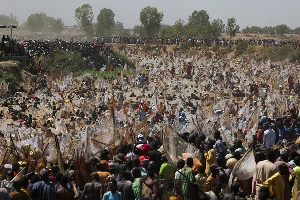Sir Sam Jonah, the Chairman, Jonah Capital Limited, has urged graduates to develop flexibility and adaptability skills to equip them for any challenge in the world of work.
He noted that flexibility and adaptability were crucial skills that every employer would be keeping an eye out for.
“Being flexible and adaptable is something that most firms and employees have had to get used to over the last couple of months,” Sir Jonah stated at the Ninth Congregation of the Kofi Annan International Peacekeeping Training Centre (KAIPTC) at Burma Camp in Accra.
“As businesses globally see a sharp rise in the number of employees being able to work from home, it is likely paradigm shift will last even after the pandemic is over,” he said.
“While being flexible in work was once aligned with geographic mobility, it is now about having an open mindset, being able to work well under pressure, adjusting to new and unexpected deadlines, prioritizing tasks and, in some instances taking on additional responsibilities.”
At the Congregation, 140 postgraduate students from seven different countries graduated.
The graduands, who were from Ghana, Cameroun, Chad, The Gambia, Mali, Nigeria, and Uganda, were made up of 62 females (44 per cent) and 78 males (56 per cent).
The Joint Congregation on the theme “Providing skills to meet Business and Human Security Needs in Uncertain Times”, was chaired by Professor Martin Morgan Tuuli, the Deputy Rector of the Ghana Institute of Management and Public Administration (GIMPA).
The graduating students were awarded Executive Master of Arts in Conflict, Peace and Security; Master of Arts in Conflict, Peace and Security; Master of Arts in Gender, Peace and Security; and Weekend Master of Arts in Conflict Peace and Security.
The Centre also awarded a doctoral degree to their first two Doctor of Philosophy (PhD) candidates – (PhD in International Conflict Management).
Sir Jonah said employers would be paying attention to staff who were flexible in their approach and execution of their daily duties such as productively working from home, capable of working on the go, adapting to new work schedules and operating with hitherto unknown systems.
With regards to tech-savvy, Sir Jonah said: “Undoubtedly, the workplace is rapidly becoming more tech-focused, and we are now well and truly progressing to a fully-realized digital age”.
He said employers would not want to just invest in technologies but in people who understand and appreciate the importance of technology.
He said although it’s unlikely that all employees would need to know every system or platform, demonstrating a firm working knowledge of data literacy, computer programming, big data, Cloud computing, artificial intelligence (AI), blockchain and more, would help catapult an employee’s marketability above their peers. He said pre-coronavirus, the widening of digital skills gap was ostensible across business worldwide; saying 82 per cent of job vacancies now require some minimum digital skills.
He said COVID-19 had, however, accelerated the frantic need for specialist digital skill sets to help businesses become more aligned with today’s myriad technologies and platforms; hence, these skill sets would be highly sought after by employers in this age.
Concerning communication and emotional intelligence, Sir Jonah said today’s employers would be seeking graduates who were able to communicate fluently, effectively and had good emotional intelligence skills.
He said employers would be looking out for graduates who were professional, courteous, polite and conscientious in their work.
Sir Jonah said one of the key considerations an employer would make during the hiring process was where graduates would fit into the current team and how well you will integrate.
“It is the job of new employees to convince employers that they are going to make the workplace happy and stress-free, including that they are capable of working well with others,” he said.
He said to have good emotional intelligence skills was to be aware of, and demonstrate empathy for, others’ emotions and behaviours which was crucial, especially when people were feeling uneasy.
Major General Francis Ofori, Commandant, KAIPTC, advised the graduands to go beyond their field of speciality because their expertise in their own field was just a stepping stone to a wider research world.
“We are living in uncertain times but we must equally understand and take advantage of the rare opportunities it offers. Never limit your potentials and capabilities in contributing to the wide range of research issues that need to be resolved globally,” he said.
General News of Saturday, 30 January 2021
Source: GNA













